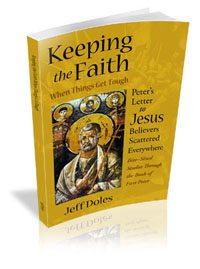But the end of all things is at hand; therefore be serious and watchful in your prayers. And above all things have fervent love for one another, for “love will cover a multitude of sins.” Be hospitable to one another without grumbling. As each one has received a gift, minister it to one another, as good stewards of the manifold grace of God. If anyone speaks, let him speak as the oracles of God. If anyone ministers, let him do it as with the ability which God supplies, that in all things God may be glorified through Jesus Christ, to whom belong the glory and the dominion forever and ever. Amen. (1 Peter 4:7-11)
The age of God’s kingdom has come into the world, bringing to a close this “present evil age,” as Paul calls it (Galatians 1:4). “The darkness is passing away and the true light is already shining,” is how John put it (1 John 2:8). The kingdom has come but it has not yet arrived in all its fullness. We are living in the in-between time, and that requires certain things of us:
- Self-control and a clear head, so we can attend to the work of effective prayer.
- Devoted, focused love for one another. There is no room for carrying grudges and holding on to unforgiveness.
- Cheerful hospitality, welcoming each other with an open heart, an open house, an open hand.
- Paul spoke of revelatory gifts (word of knowledge, word of wisdom and discerning of spirits) and spent much time on the operation the gifts of divine speech (prophecy, tongues and interpretation of tongues). For Peter, those with speaking gifts should be careful to give God’s words, not their own.
- Paul talked about manifestations of power (faith, gifts of healings and workings of miracles), and in Romans 12:6-8, mentioned gifts of service (serving, giving, leading, showing mercy). For Peter, in addition to gives of speaking, there are gifts of doing, or ministering, or serving. Those who serve are to do so, not depending on their own natural ability, but with the ability that God supplies.

Keeping the Faith When Things Get Tough
Peter’s Letter to Jesus Believers Scattered Everywhere
Bite-Sized Studies Through First Peter
by Jeff Doles
Preview with Amazon’s “Look Inside.”
Available in paperback and Kindle (Amazon), epub (Google and iTunes) and PDF.

